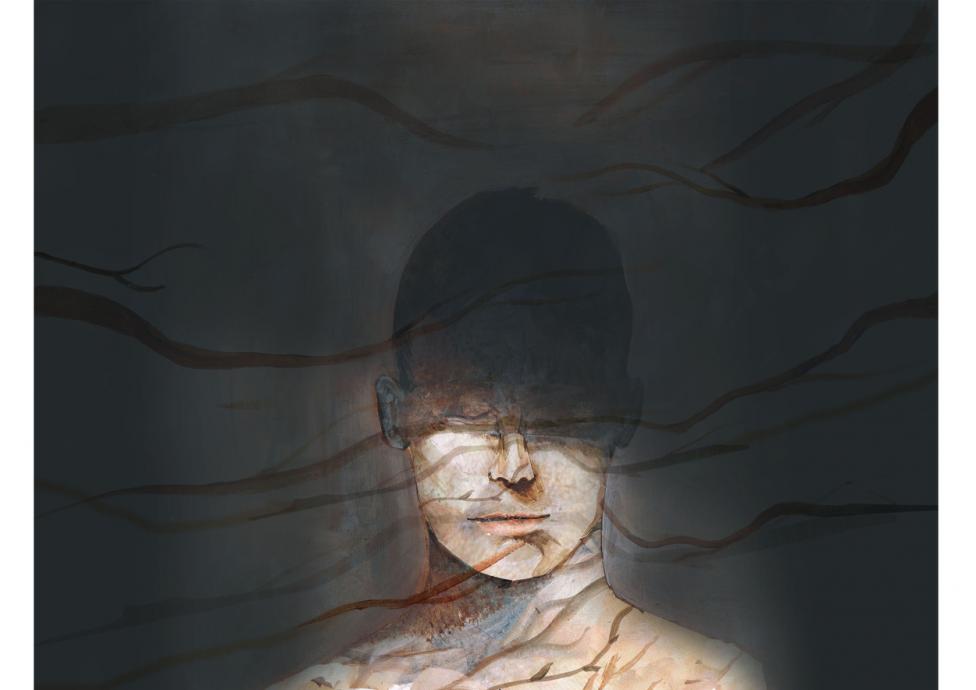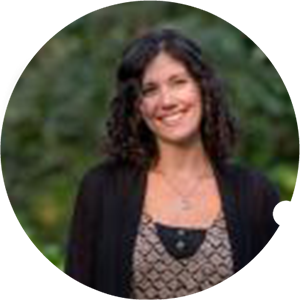Halfway through the fifth season of the TV show Lost, Jack Shephard has a panic attack. This happens during a flashback, of course. Jack as we knew him on Lost—steady, doctorly, irritatingly in-control Jack—would never do anything so silly. But back in his pre-island life, we see him as a young medical resident performing surgery on a sixteen-year-old’s spine. As he’s finishing up the procedure his hand slips, slicing open the girl’s dural sac. Nerves and spinal fluid come spilling out. Jack stands over the waiting body, sweating, frozen. Rendered useless by panic.
I’ve learned that fighting a feeling, any feeling, will only cause it to lurk in my personal darkness, growing stronger like a cockroach.
We viewers knew this moment was coming. Jack had told us this story in the series’ pilot episode, way back in 2004. He’d just crash-landed onto that island with everybody else. He had a nasty cut on his shoulder, and he bullied skittish, green-eyed Kate into sewing him up. “Just like a pair of curtains,” he’d said, handing her a spool of thread from a suitcase sewing kit. When she seemed afraid, possibly nauseated, he told his surgery-gone-wrong story. “So it ripped open,” he said as she sewed, “and the terror was just so crazy. So real. And I knew I had to deal with it. So I made a choice. I’d let the fear in, let it take over, let it do its thing, but only for five seconds. That was all I was going to give it. So I started to count.”
He counted dramatically. Kate blinked beautifully. She listened as if Jack had all the answers, which I suppose in this scene he did.
“And then it was gone,” he said, as if mystified. “I went back to work, sewed her up, and she was fine.”
That was the first story Jack told on that beach. The first thing he offered of himself. It’s an anecdote, really, but it had become his seminal story.
More than a decade later, it somehow became one of mine.
•
I sent my first-ever submission, an essay, out into the world when I was 32. I’d just begun an MFA program and was tip-toeing my way toward a writing life. It was a mail-in submission to a high-tiered print magazine. I kissed the envelope good luck, and I waited.
A full year later, after many other submissions and an equal number of rejections, I heard from the original magazine. They loved my essay, turned out. Would I email them a copy for their next editorial meeting? “This isn’t a promise of publication,” they said. “Not yet.”
But we’re close, baby, is what I heard.
When the final rejection rolled in, it kicked me right in the teeth. The actual wind got knocked out of my actual body. I hadn’t thought this magazine would publish me at all, but then they almost did, and I suppose for that one month, floating in a liminal space between rejection and acceptance, between never-published and right-out-of-the-gate winner, my hopes had gotten away from me. I’d briefly imagined myself an ingenue of the writing world, that freak writer with instant fame, recognition, all of the accolades. I didn’t particularly desire fame or accolades, but I very much wanted to be a good writer, and what better way of finding out you’re “good,” I thought then, than publication?
I was at a residency when the rejection came, surrounded by other writers, all of whom instantly appeared smarter, funnier, and more talented than me. Prettier, too. Overwhelmed with my feelings, I took myself to bed. In the middle of bucolic Vermont summer afternoon.
Lying there in broad daylight, sort of kicking around under the blankets, I found myself remembering Jack’s count-to-five trick. I hadn’t seen an episode of Lost since it went off-air in 2010. But nonetheless, there he was, walking around my head, lecturing Kate and being all sure of himself.
“Let it in,” he’d said. “Let it do its thing. But only for five seconds. Then get back to work.”
He was talking about fear, whereas I was dealing with rejection. Still, I thought the base logic might do.
“You get one night,” I told myself. “Then get back to work.”
So I moped. I took it seriously and put on sweatpants. I berated myself for a while—so untalented, so trite on the page. How hideous my hair was, too, now that I thought about it. And by the way, how pathetic to be trying to be a writer at all, so old at 33. Shouldn’t I have let childish dreams go by now?
Within an hour of this—two, tops—I realized I was supremely bored. I forced myself out of bed and tracked down my friends. We ate ice cream, went to a reading, played pool, and gossiped all night. In the end, it wasn’t a bad day.
It’s been four years since that afternoon. Rejections don’t make me panic these days, nor do they make me sweat sexily like Jack (although let’s be clear, I was more of a Desmond girl). But every once in a while, one still has the power to knock me right off my horse. An unpleasant feeling, absolutely, but these days I accept that pain rather than ignoring it or fighting it with false stoicism. I’ve learned that fighting a feeling, any feeling, will only cause it to lurk in my personal darkness, growing stronger like a cockroach. So now I invite my negative feelings into the light. I let them course through my balled-up fists and my exhausted brain and my sick-of-editing eyes—but with a countdown clock on.
Let’s know this and hold it in our hands: one single acceptance will make up for dozens (and dozens) of rejections.
I finally had my first fiction published last spring. It took two years of constant submitting to get there, but get there we did, and then it picked up an award I hadn’t known existed, which was just gravy. That story was originally rejected 37 times. My second major publication, an essay called "Dredging Up Wanderlust," was published here, in the astonishing North American Review. I wrote the first draft when I was 31 years old. Now I’m 37. I worked on it more or less the entire time. It was previously rejected 44 times.
•
When I began my MFA program at Bennington College, the director and wonderful writer Sven Birkerts welcomed our incoming class in front of the program community. He said something in that lecture hall that I’ve never forgotten.
“Ten years,” he said. “That’s about how long it takes to find any success as a writer.”
People around me gasped. One girl snorted. “I don’t have ten years, buddy,” she said.
But I found myself nodding. Ten years. Okay. I’d been writing seriously for two by then—long enough to know how much I didn’t know. So, eight years to go. I liked the roundness of the numbers, the spaciousness. It all sounded reasonable. I walked out of the lecture hall into the frosted January morning feeling steady, sure.
By Sven’s logic, I have three years to go. I don’t know what those years will bring, but I’m sure rejection will be a large part of the game. I suspect many of those rejections won’t hurt, but that some will, and deeply. I expect to think of Jack often.
“It only ends once. Anything before that is just progress,” said Lost’s mythical Jacob in season five, sitting on a beach in front of a giant statue of a man-dog. Jacob was concocted out of some truly awful writing, but let’s believe him anyway. Let’s know this and hold it in our hands: one single acceptance will make up for dozens (and dozens) of rejections. All it takes is one singular editor, agent, or publisher to say yes instead of no. That’s it. And then the piece is published, and no one will ever know about your many rejections (unless you are silly enough to be honest about them on the internet).
In the end, getting published isn’t actually the hard part. Getting a piece picked up feels wonderful, of course, and so does seeing your beloved story in print, holding it in your hands. But the sad truth is that the very next morning, you’re still you, that same old shmuck stalled out before a blank computer screen, wondering how in the world you’re going to create anything worth reading ever again. And again. And again.
Turns out, all that really matters is the again. Not the rejection (or occasional success) but the morning after courage to sit down, to start over. That’s the hard part. So these days, when I find myself frozen before the page, I remember what to do. I count to five and get back to work.




